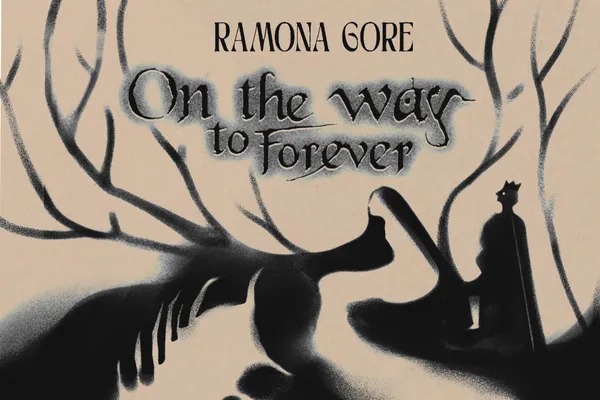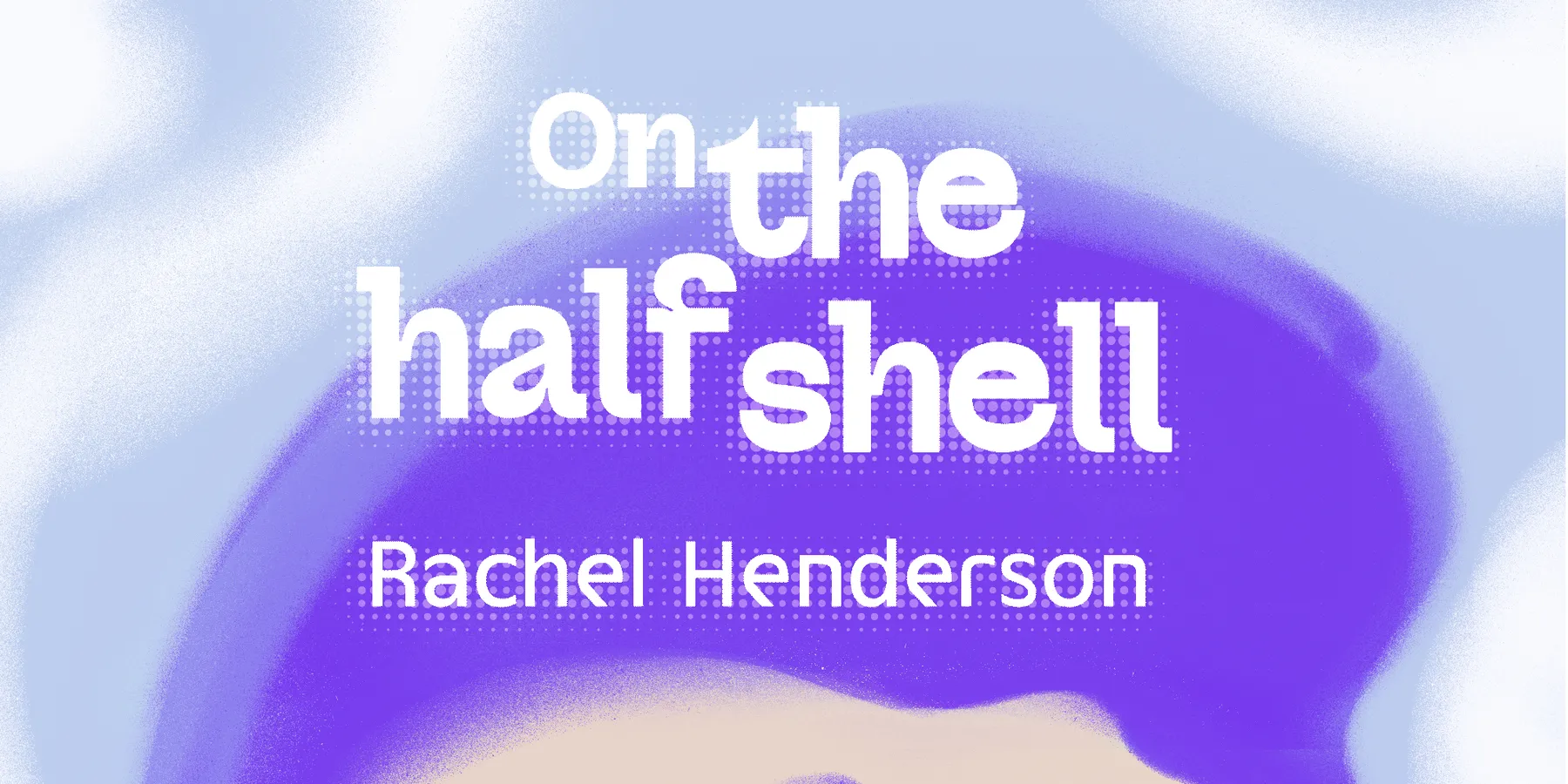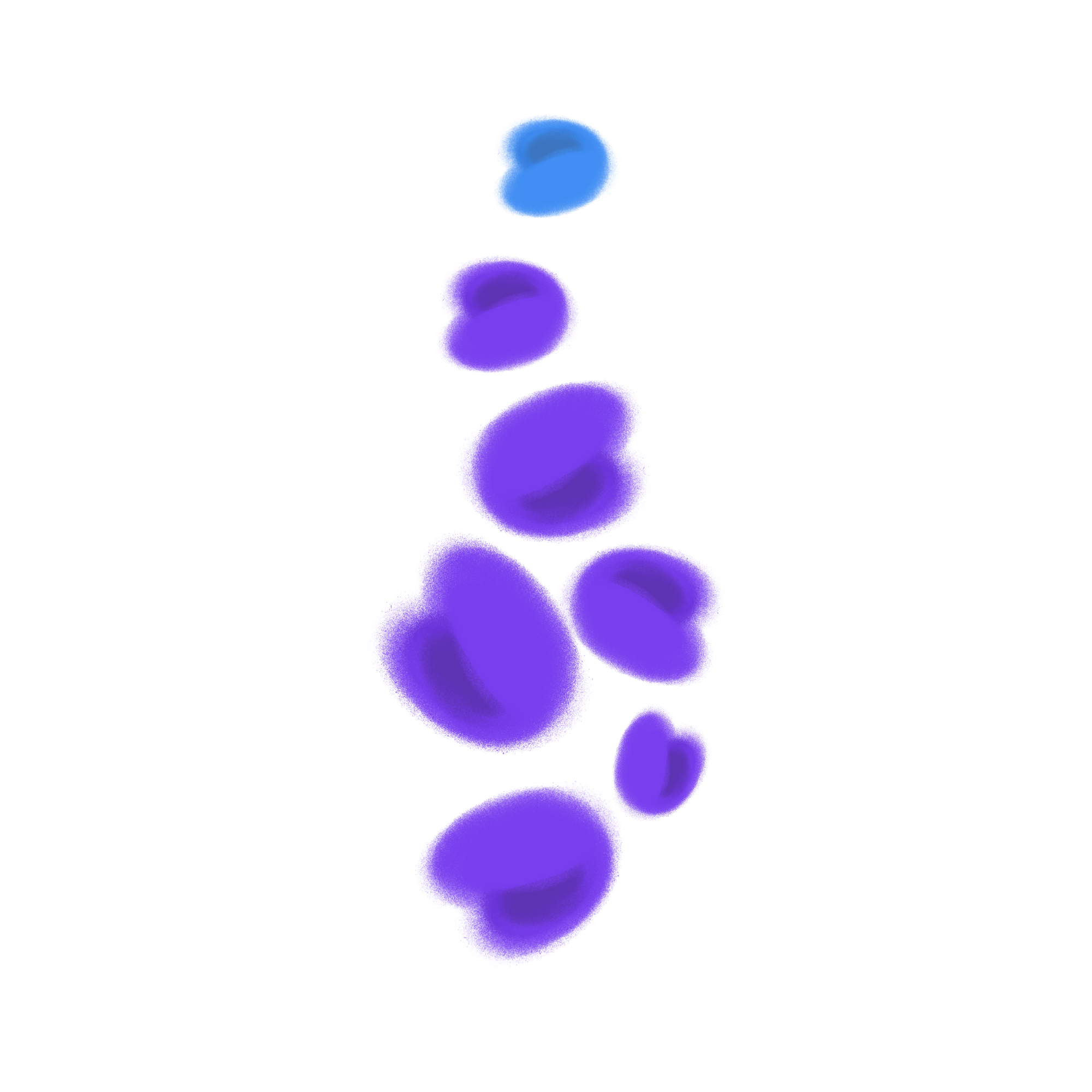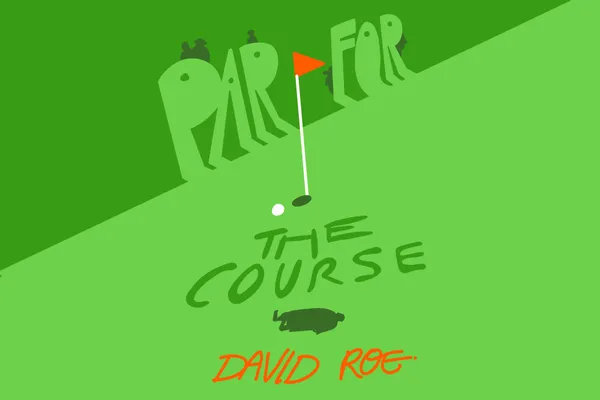
🪱 On the way to forever
by Ramona Gore
by Rachel Henderson

The oyster blinks.
The motion is what startles Floyd—not the oyster’s button nose, or her playfully curved lips, or the regal glint in her lovely gray eyes—he only sees these after the blink, that languid down-up slide of her lids, and even then, he can explain it all away. Trick of the light. Genetic mutation. One too many whiskey doubles the night before.
But when the oyster blinks again, Floyd drops his knife.
Oysters don’t have faces.
Not like this, anyway—a human face, a woman’s face. Floyd has shucked thousands of oysters, all slimy little globs, a rare few hiding pearls, and exactly none with eyes. Blinking, staring, sentient eyes.
The oyster’s shell hums against his gloved fingers. Her mouth opens.
“You need to take us home.”
It’s a small voice—small but strong—as if the tiny lips are fluttering directly against Floyd’s eardrum. His knees liquefy and he sways into the shucking station.
Breathe. Count to ten. Breathe. Count to ten. Breathe.
He’s losing his mind. No question. It starts with a talking face on the half-shell, and ends with a permanent address at the state hospital.
“Did you hear me? You need to take us home.”
Floyd’s eyes squeeze shut. Booze—the booze has finally pickled his brain. Hitting the bottle after every shift, washing the workday agony away, shot by shot, rolling off the mattress each morning with a shrieking headache. Too many years of the same bad routine. It was bound to catch up with him eventually.
“Maybe I’m just dreaming,” he mumbles.
“Dreaming? You think you’re asleep?”
Floyd takes a shuddering breath and focuses on the telltale odors of Prejean’s Grill & Oyster Bar: saltwater, cheap beer, bleach. He leans closer to his shucking station, inhaling the fishy fumes, the hint of wet rock wafting from the bags of unopened oysters, and his heart sinks. Nobody can smell in dreams. He remembers reading that somewhere—dreams are scentless.
“Guess not,” he says.
“Open your eyes then.”
He obliges with one eye—squints down at the oyster. Her lips are pursed.
“You need to take us—”
“Home. You said that. I need to take you home.”
“Not just me. All of us.”
Floyd gently sets the oyster on the shucking bar and presses his hands against his cheeks. The rubber gloves are icy-cold—soothing.
“I’m hallucinating,” he says.
“What makes you think that?”
“Imaginary conversations with non-existent talking oysters. Insane red flag.”
The oyster’s upper lip curls back, revealing a row of perfectly square teeth.
“Nonexistent? Don’t insult me.”
See if she knows your name. If she does, this is all in your head.
“What’s my name?” he asks.
The oyster’s nose scrunches up.
“How should I know?”
“You would if you’re part of my brain.”
The oyster’s eyes snap shut.
“The idea that I’m part of a murderer is even more insulting than the idea that I’m nonexistent.”
Floyd glances down at his shucking knife, lying on the damp concrete.
“I’m not a murderer.”
“You are now,” she says. “But you won’t be—if you take us home.”
Her eyes open and bore into Floyd’s. He can’t look away—there’s something ferocious in her gaze, a wet sparkle around the irises. She’s more alive than the slack-jawed tourists he serves each night, barking out their dozen and half-dozen orders, slurping the meat and dumping slimy shells on the bar top, tipping practically nothing.
More alive.
“Where is home?” he asks.
“Bay Boudreau.”
Bay Boudreau—Floyd’s grandfather took him out there once. The childhood memory is hazy, but it involved a skiff and endless vistas of open water. He rubs the back of his neck.
“Don’t think I can get you there without a boat.”
“A man without a boat,” she says. “How do you fish?”
“Never been much of a fisherman.”
The oyster smiles. Two dimples appear in her round cheeks—the sight of them makes Floyd smile too, despite himself—an oyster with dimples.
“You’re less of a murderer than I thought,” she says. “If Bay Boudreau is unrealistic, Chef Menteur Pass is close enough. Can you get us there?”
“I’m still not—”
“Can you please get us there?”
Her smile is gone. The lines around her nose sag downward—the furious glimmer in her eyes turns muddy.
You’re about to make an oyster cry.
“How—how many is ‘us,’ exactly?” he asks.
“Pick me up.”
He obeys, lifting the oyster high above the shucking bar—her eyes dart around his workspace. Ten fresh sacks of oysters were delivered that morning, awaiting his knife, and he’s barely gotten started. Prejean’s doesn’t open for another thirty minutes.
“All of them,” she says.
“All of them?”
Her eyes move from sack to sack, and her brow pitches forward—a nod, or as close to a nod as possible.
“Well-arched hinges—beautifully rounded fringe—yes, I recognize them all. We came here together,” she says, “and if we came together, we should leave together. It’s only fair.”
“I can’t take you all without someone noticing. I’d get fired. Maybe arrested.”
The oyster flares her nostrils.
“Kill me now, then,” she says.
“What?”
“Kill me. If you’re not taking us home, pick up the knife and finish what you started.”
“I can’t kill you.”
“Why not? It’s your job, after all.”
Floyd tightens his grip on her shell. Every muscle in her face is alert, jumping from emotion to emotion—rage, hope, misery, acceptance—all punctuated by petite, rasping breaths. Drowning in the air. Waiting for the knife—his knife. He stares at the quivering bow of her mouth and wishes he could give her a hug.
“OK,” he says. “I’ll take you home.”
“You will?”
“Yes.”
“All of us?”
“All of you.”
“Swear it,” she says. “Swear to me you’ll take us all home.”
Floyd gives her a soft smile and presses one hand to his chest, directly over his heart.
“I swear I’ll take you all home.”

The oyster lets out a high sob—he cups his palm around her and surveys the empty restaurant. Fifteen minutes until opening. Front door locked. Servers and bartenders chain-smoking in the back alley, line cooks finishing their prep, general manager waking up from his pre-shift nap in the office. An obstacle course of burnouts, snitches, and assholes.
You forgot about Busboy Jesse.
“Just thought of something,” Floyd says. “I’m going to leave you here for a minute—”
The oyster hiccups.
“Here—alone?”
Floyd frowns, glances down, and sees his apron.
“Actually, I’ll take you along,” he says. “Can you stand being in the dark for a few minutes?”
The oyster flashes him a broad grin.
“I’ve spent my whole life in the dark.”
“Right. Stupid. Sorry.”
Her face wobbles back and forth.
“Don’t apologize. Do what you have to,” she says.
Floyd lowers the oyster into his apron pocket and moves through the restaurant with broad steps, gently as he can, worrying the rough canvas will chafe her smooth, delicate skin. Her shell bounces against his upper thigh—unseen. She feels heavier. Inanimate. Rock-like.
He peeks into the pocket, half-expecting an empty shell—but her face is still there, mouth a thin line, forehead wrinkled.
“What?” she asks.
“Nothing. Had to check.”
Busboy Jesse is stationed where he always is before opening, cross-legged on the floor next to the sink, thumbing through a paperback, oblivious to the world.
“Hey buddy,” Floyd says. “Got a favor to ask.”
“I’m off the clock.”
“Not a work favor, just a favor-favor. I need to borrow your big trash can. The wheelie one.”
“Sounds like a work favor to me.”
Floyd grits his teeth.
“I don’t need it for work—”
“Oh, sure, sure,” Busboy Jesse says. “Personal trash can business?”
“Yes.”
“Which is?”
“Would you just let me borrow the damn can?”
“Sounds like top secret trash can business to me.” Busboy Jesse closes his book and peers up at Floyd with bloodshot eyes. “Don’t know if I want to get tangled up in top secret trash can business, on or off the clock.”
Floyd plucks at the apron pocket, twisting a loose thread between his fingers.
“I have to get the oyster sacks outside,” he says.
“Outside? Why?”
“I—I’m taking the oysters home.”
Busboy Jesse smirks.
“Shit, dude,” he says. “All of them?”
“Yeah.”
“Big haul. Most folks are happy stealing a few extra bucks from the cash register. How’re you expecting to eat that many oysters?”
“Not taking them to eat.”
“Sure, got it, got it. So if I lend you the big trash can, you won’t mind me taking a sack or two for myself, right?”
The oyster flutters—Floyd pats his apron front.
“Wrong,” he says. “I’d definitely mind.”
“I won’t help you steal $500 worth of product for nothing. Shit deal. Go away.”
“If you help, I’ll let you borrow my car anytime you want, no questions asked.”
Busboy Jesse re-opens his paperback, licks his index finger, and turns the page.
“How about you give me your car,” he says, “and not only will I lend you the trash can, not only will I help you load all the oysters into it, but I’ll also not tell everyone about this conversation as soon as you walk away. Sound alright?”
Floyd’s left hand drifts into the apron pocket. His fingertips dance across the oyster’s shell—she’s trembling.
I swear I’ll take you all home.
“Fine,” he says. “Car’s yours, starting tomorrow.”
“Tomorrow?”
“Yes. Tonight, I need it.”
Moving the oysters is easier than Floyd expects, especially with Busboy Jesse’s assistance. The sacks fit comfortably inside the huge trash can, and they’re able to wheel it through the kitchen, out the back, down the alley, and into the parking lot, without so much as a sideways glance. They load six sacks in the car’s trunk, three in the backseat, and one on the passenger-side floor. Busboy Jesse leaves him with a handshake that’s more Faustian than friendly before he scurries back inside. One minute to spare before opening.
Floyd lowers himself into the driver’s seat, turns the ignition, and retrieves the oyster from his apron. She’s finally stopped shivering.
“Are we all here?” she asks.
“Yes. Loaded up and ready to go.”
She exhales—her breath is strangely warm against his wrist.
“I’d like to ride outside the pocket, if it’s all the same to you,” she says.
Floyd peels off his gloves, stuffs them in the cup holder, and eases the oyster into the center, like a bird’s egg in a little rubber nest. She blinks slowly—the corners of her mouth turn up.
“Thanks,” she says.
“My pleasure.”
Traffic is light. Floyd navigates it effortlessly, enjoying the low winter sun behind them. He catches himself looking down at the oyster every ten seconds or so. Sometimes her eyes are closed, sometimes she’s gazing up at the ceiling—but most times, she’s staring directly at him. Seeing this makes Floyd smile.
Every time Floyd smiles, the oyster smiles back.
“Did you know you have dimples?” Floyd asks.
“Not until now.”
“Dimples are very underrated,” he says. “They’re one of the best things a face can have.”
The oyster laughs.
“I’ve never seen my own face. Maybe you can show me before I’m back home?”
Floyd nods, drumming his fingers on the steering wheel.
“Do the other oysters have faces too?” he asks. “The ones that came with you?”
“I suppose they might.”
“Thought you’d be able to tell.”
“I’m not magic,” the oyster says. “I can’t see inside them any more than I can see inside you. Their shells might be full of faces. Your insides might be full of pearls.”
“Pearls don’t grow inside humans.”
“And what a shame that is.”
Floyd’s car shakes and rattles as smooth asphalt gives way to older, chewed-up roads—the oyster bounces around in her cup holder perch, in danger of falling out. He scoops her up and rests his hand on his leg.
“Thanks,” she says. “Your hand feels nice without the glove. Warm.”
He’s surprised she likes the warmth. Through all his years of shucking oysters, nestling their half-shell bodies in ice, he assumed cold was best, never expecting to learn otherwise. He squeezes the steering wheel as he pulls the car onto the shoulder, tires crunching through the gravel mixed with oyster shells—always oyster shells.
You’ve shucked thousands of oysters.
“Sorry for being a murderer,” he says.
The oyster’s eyes glisten. Her tiny teeth nibble at the corner of her lower lip.
“I forgive you,” she says.
“If I’d known—if I met you before—I never would’ve done that job.”
His thumb inches into her shell, grazes her forehead; a flush spreads across the crystalline gray in her cheeks.
“I believe you,” she whispers.
Floyd turns off the ignition and leans back.
“We’re here,” he says.
Ten sacks of oysters—ten trips down the gummy shores of Chef Menteur Pass near an old concrete piling. Floyd is careful with each sack, slipping oysters into the brackish water one by one. Taking his time.
Delaying the inevitable.
“I appreciate you being gentle with them,” the oyster says. Carrying her back and forth has slowed the process even further, but she refuses to stay in the car. And every time he sets her down, she seems on the verge of tears.
“Least I could do.”
“No, the least you could do is dump them by the sackful. What most people would do. But not you.”
“Guess not.”
“You’re a sweet human, whatever-your-name-is.”
He grins.
“Floyd. My name is Floyd.”
“Sweet human Floyd.”
He slides the last oyster from the last sack into the passage.
“Seems it’s my turn,” she says.
“It is…”
Light flickers across the lazy waves as the sun begins to set. The oyster’s eyes swivel toward the water. Her rippled reflection beams up at him, dimples and all.
“Would you carry me to the piling, Floyd? I know you’ll get wet, but—”
He strides into the passage without a second thought. Water submerges his feet, knees, hips, chest. Briny air fills his lungs; he rests his back against the piling. The concrete is slick and warm.
“What now?” he asks.
“Now—I’m home.”
Floyd and the oyster stare at each other.
Neither smiles.
Neither moves.
Neither breathes.
“You may not be an oyster,” she says, “but I do think you are full of pearls.”
It’s the strangest sensation. Floyd knows he’s leaning down, toward the oyster, but he also watches her moving up to meet him, gray eyes growing larger—larger—larger. The piling stretches upward, looming overhead like an ancient obelisk. Floyd’s back cleaves to the concrete. Water swirls around him—inside him. He can feel his own well-arched hinges, his own beautifully rounded fringe. He can see the oyster’s face in exquisite detail, even lovelier at this size—and when her soft lips press joyfully against his own, and fireworks explode in his tiny bivalve heart, he realizes it’s the perfect size to be.
This week’s ad slot was purchased by friend of Foofaraw, Evan Passero, in support of Elevated Access—a non-profit organization that enables people to access healthcare by providing flights on private planes at no cost, whose volunteer pilot network transports clients seeking abortion or gender-affirming care across the United States.
Foofaraw will match up to $300 in donations to DIFFA Dallas, Elevated Access, and Denton Community Food Center through the remainder of 2025.


